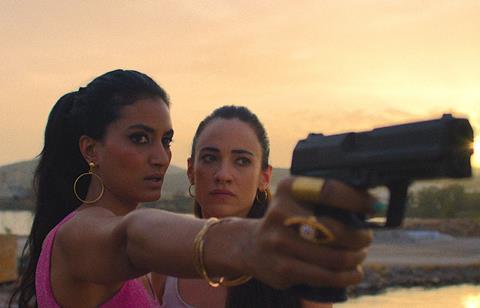Evi Kalogiropoulou’s debut plays Thessaloniki after its Venice Critics Week debut

Dir: Evi Kalogiropoulou. Greece/France. 2025. 96mins
In a Greek city-state ruled by shirtless macho men, changes are on the horizon as a woman positions herself to become their new leader. Greek writer/director Evi Kalogiropoulou’s debut feature Gorgona is a dystopian drama that takes inspiration from sources as different as Baz Luhrman’s Romeo + Juliet and Claire Denis’s Beau Travail. Kalogiropoulou knows her references, but never quite manages to fuse all those elements into something distinctly her own.
There’s an appealing element of spectacle involved
That said, a story of queer female empowerment should interest further festivals following its Venice Critics Week premiere and subsequent Thessaloniki berth, and it could also attract the attention of streaming platforms.
Sometime in the dystopian future, Greece has reverted back to the city-state system of yore. The film’s location is a polis whose entire post-apocalyptic economy is driven by selling oil from their refineries to other cities. Almost all vegetation is either poisonous or dead, with the locals trading their oil for the basic necessities needed by the men running the city: food and women. Kalogiropoulou clearly establishes the patriarchal structure of the (male) ruling class which needs to be overthrown but never addresses many other issues, like how they continue to exist as a city if women have to be imported.
One of the ladies traded for a barrel of oil is the fiery Eleni (Aurora Marion), a singer and sex worker brought into the city in a dress made from golden chains and not much else (costume design is far from subtle) for the entertainment of the ruling males. Their leader, the fiftyish Nikos (a buff Christos Loulis, Miss Violence), is suffering from some kind of terminal disease and has organised games — what else is a Greek city state to do? — to try and determine which of the men will become his successor. But to the shock of many, one of the participants is the fierce Maria (Melissanthi Mahut), who is in a relationship with Nikos that not everyone seems to be aware of.
Maria has the tough task of facing all the men and overcoming their hatred of women to try to become their ruler and she finds an unexpected ally in Eleni, the two women becoming more than just friends. Their supposed love story is the least convincing part of the narrative, making more sense as an idea than as something convincingly pulled off by both the screenplay — co-written by the director and Louise Groult — and the performances. There’s also a real sense that Kalogiropoulou can’t quite handle the tonal shifts required to make Gorgonà into both a convincing love story and a kick-ass feminist critique.
Yet there’s an appealing element of spectacle involved in seeing a couple of strong women take on the patriarchy. The beats may be familiar and the ending somewhat obvious but, whenever it focuses on the city’s power struggle, there’s certainly some entertainment value in this modestly budgeted dystopian fable.
Production companies: Neda Film, Blue Monday Productions, Kidam, Blonde
International sales: Playtime, info@playtime.group
Producer: Amanda Livanou
Screenplay: Evi Kalogiropoulou, Louise Groult
Cinematography: Giorgos Valsamis
Production design: Stavros Liokalos
Editing: Yorgos Zafeiris
Music: Ilias Kampanis, Karolos Berahas, Nick Athens
Main cast: Melissanthi Mahut, Aurora Marion, Christos Loulis, Kostas Nikouli, Stavros Svigkos, Errika Bigiou, Niki Vakali, Ksenia Ntania, Erifili Kitzoglou, Hercules Tsuzinov, Myrto Kontoni, Nayla Gougni, Vassilis Mihas, Tonia Sotiropoulou
























